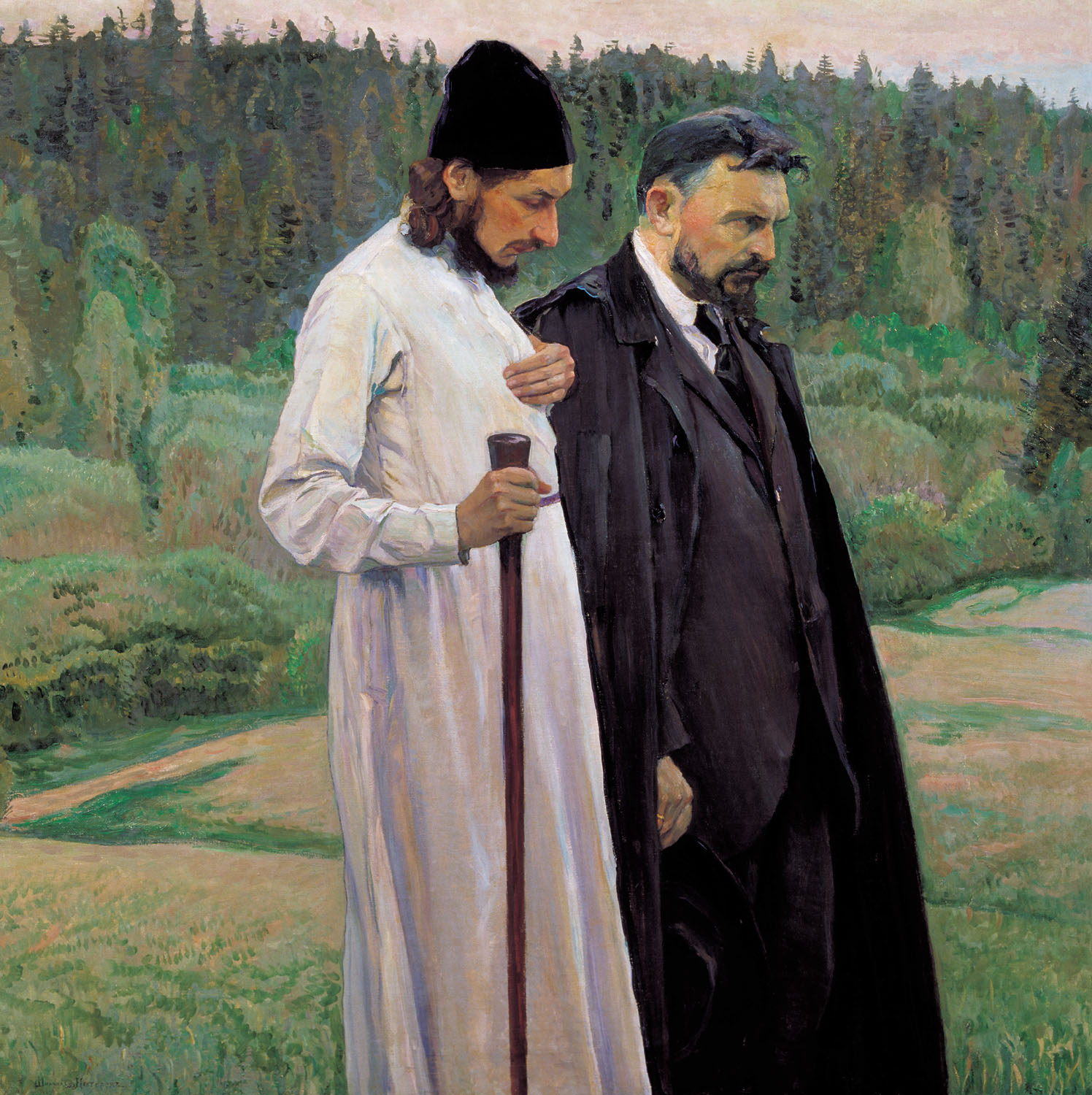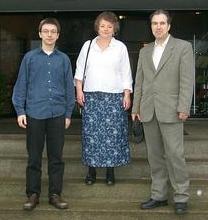|
Gennady Semenovich Makanin
Gennady (or Gennadii or Gennadiy) Semenovich Makanin (1938‚Äì2017) was a Russian mathematician, awarded the 2010 I. M. Vinogradov Prize for a series of papers on the problem of algorithmically recognizing the solvability of arbitrary equations in free groups and semigroups. Education and career At Moscow State University he received his undergraduate degree and in 1967 his Russian Candidate of Sciences degree (PhD). His dissertation –ö –ø—Ä–æ–±–ª–µ–º–µ —Ç–æ–∂–¥–µ—Å—Ç–≤–∞ –≤ –∫–æ–Ω–µ—á–Ω–æ-–æ–ø—Ä–µ–¥–µ–ª—ë–Ω–Ω—ã—Ö –≥—Ä—É–ø–ø–∞—Ö –∏ –ø–æ–ª—É–≥—Ä—É–ø–ø–∞—Ö (On the identity problem in finitely-presented groups and semigroups) was supervised by Andrey Markov Jr. and Sergei Adian. Makanin spent his career (since 1966) working at the Steklov Institute of Mathematics (since 2013 as a freelance employee). From the Steklov Institute of Mathematics he received in 1977 his Russian Doctor of Sciences degree (similar to habilitation) with dissertation –ü—Ä–æ–±–ª–µ–º–∞ —Ä–∞–∑—Ä–µ—à–∏–º–æ—Å—Ç–∏ — ... [...More Info...] [...Related Items...] OR: [Wikipedia] [Google] [Baidu] |
Steklov Institute Of Mathematics
Steklov Institute of Mathematics or Steklov Mathematical Institute (russian: –ú–∞—Ç–µ–º–∞—Ç–∏—á–µ—Å–∫–∏–π –∏–Ω—Å—Ç–∏—Ç—É—Ç –∏–º–µ–Ω–∏ –í.–ê.–°—Ç–µ–∫–ª–æ–≤–∞) is a premier research institute based in Moscow, specialized in mathematics, and a part of the Russian Academy of Sciences. The institute is named after Vladimir Andreevich Steklov, who in 1919 founded the Institute of Physics and Mathematics in Leningrad. In 1934, this institute was split into separate parts for physics and mathematics, and the mathematical part became the Steklov Institute. At the same time, it was moved to Moscow. The first director of the Steklov Institute was Ivan Matveyevich Vinogradov. From 19611964, the institute's director was the notable mathematician Sergei Chernikov. The old building of the Institute in Leningrad became its Department in Leningrad. Today, that department has become a separate institute, called the ''St. Petersburg Department of Steklov Institute of Mathematics of Russian Academy ... [...More Info...] [...Related Items...] OR: [Wikipedia] [Google] [Baidu] |
Julia Robinson
Julia Hall Bowman Robinson (December 8, 1919July 30, 1985) was an American mathematician noted for her contributions to the fields of computability theory and computational complexity theory—most notably in decision problems. Her work on Hilbert's tenth problem (now known as Matiyasevich's theorem or the MRDP theorem) played a crucial role in its ultimate resolution. Robinson was a 1983 MacArthur Fellow. Early years Robinson was born in St. Louis, Missouri, the daughter of Ralph Bowers Bowman and Helen (Hall) Bowman. Her father owned a machine equipment company while her mother was a school teacher before marriage. Her mother died when Robinson was 2 years old and her father remarried. Her older sister was the mathematical popularizer and biographer Constance Reid and her younger sister is Billie Comstock. When she was 9 years old, she was diagnosed with scarlet fever which was shortly followed by rheumatic fever. This caused her to miss two years of school. When she was w ... [...More Info...] [...Related Items...] OR: [Wikipedia] [Google] [Baidu] |
Soviet Mathematicians
The Soviet Union,. officially the Union of Soviet Socialist Republics. (USSR),. was a transcontinental country that spanned much of Eurasia from 1922 to 1991. A flagship communist state, it was nominally a federal union of fifteen national republics; in practice, both its government and its economy were highly centralized until its final years. It was a one-party state governed by the Communist Party of the Soviet Union, with the city of Moscow serving as its capital as well as that of its largest and most populous republic: the Russian SFSR. Other major cities included Leningrad (Russian SFSR), Kiev (Ukrainian SSR), Minsk (Byelorussian SSR), Tashkent (Uzbek SSR), Alma-Ata (Kazakh SSR), and Novosibirsk (Russian SFSR). It was the largest country in the world, covering over and spanning eleven time zones. The country's roots lay in the October Revolution of 1917, when the Bolsheviks, under the leadership of Vladimir Lenin, overthrew the Russian Provisional Government tha ... [...More Info...] [...Related Items...] OR: [Wikipedia] [Google] [Baidu] |
Russian Philosophers
Russian philosophy includes a variety of philosophical movements. Authors who developed them are listed below sorted by movement. While most authors listed below are primarily philosophers, also included here are some Russian fiction writers, such as Tolstoy and Dostoyevsky, who are also known as philosophers. Russian philosophy as a separate entity started its development in the 19th century, defined initially by the opposition of Westernizers, advocating Russia's following the Western political and economical models, and Slavophiles, insisting on developing Russia as a unique civilization. The latter group included Nikolai Danilevsky and Konstantin Leontiev, the early founders of eurasianism. The discussion of Russia's place in the world has since become the most characteristic feature of Russian philosophy. In its further development, Russian philosophy was also marked by deep connection to literature and interest in creativity, society, politics and nationalism; cosmos and ... [...More Info...] [...Related Items...] OR: [Wikipedia] [Google] [Baidu] |
Russian Logicians
Russian(s) refers to anything related to Russia, including: *Russians (, ''russkiye''), an ethnic group of the East Slavic peoples, primarily living in Russia and neighboring countries *Rossiyane (), Russian language term for all citizens and people of Russia, regardless of ethnicity *Russophone, Russian-speaking person (, ''russkogovoryashchy'', ''russkoyazychny'') *Russian language, the most widely spoken of the Slavic languages *Russian alphabet *Russian cuisine *Russian culture *Russian studies Russian may also refer to: *Russian dressing *''The Russians'', a book by Hedrick Smith *Russian (comics), fictional Marvel Comics supervillain from ''The Punisher'' series *Russian (solitaire), a card game * "Russians" (song), from the album ''The Dream of the Blue Turtles'' by Sting *"Russian", from the album ''Tubular Bells 2003'' by Mike Oldfield *"Russian", from the album '' '' by Caravan Palace *Nik Russian, the perpetrator of a con committed in 2002 *The South African name for a ... [...More Info...] [...Related Items...] OR: [Wikipedia] [Google] [Baidu] |
Soviet Logicians
The Soviet Union,. officially the Union of Soviet Socialist Republics. (USSR),. was a transcontinental country that spanned much of Eurasia from 1922 to 1991. A flagship communist state, it was nominally a federal union of fifteen national republics; in practice, both its government and its economy were highly centralized until its final years. It was a one-party state governed by the Communist Party of the Soviet Union, with the city of Moscow serving as its capital as well as that of its largest and most populous republic: the Russian SFSR. Other major cities included Leningrad (Russian SFSR), Kiev (Ukrainian SSR), Minsk ( Byelorussian SSR), Tashkent (Uzbek SSR), Alma-Ata (Kazakh SSR), and Novosibirsk (Russian SFSR). It was the largest country in the world, covering over and spanning eleven time zones. The country's roots lay in the October Revolution of 1917, when the Bolsheviks, under the leadership of Vladimir Lenin, overthrew the Russian Provisional Government ... [...More Info...] [...Related Items...] OR: [Wikipedia] [Google] [Baidu] |
Mathematical Logicians
Mathematics is an area of knowledge that includes the topics of numbers, formulas and related structures, shapes and the spaces in which they are contained, and quantities and their changes. These topics are represented in modern mathematics with the major subdisciplines of number theory, algebra, geometry, and analysis, respectively. There is no general consensus among mathematicians about a common definition for their academic discipline. Most mathematical activity involves the discovery of properties of abstract objects and the use of pure reason to prove them. These objects consist of either abstractions from nature orin modern mathematicsentities that are stipulated to have certain properties, called axioms. A ''proof'' consists of a succession of applications of deductive rules to already established results. These results include previously proved theorems, axioms, andin case of abstraction from naturesome basic properties that are considered true starting points of ... [...More Info...] [...Related Items...] OR: [Wikipedia] [Google] [Baidu] |
2017 Deaths
This is a list of deaths of notable people, organised by year. New deaths articles are added to their respective month (e.g., Deaths in ) and then linked here. 2022 2021 2020 2019 2018 2017 2016 2015 2014 2013 2012 2011 2010 2009 2008 2007 2006 2005 2004 2003 2002 2001 2000 1999 1998 1997 1996 1995 1994 1993 1992 1991 1990 1989 1988 1987 See also * Lists of deaths by day The following pages, corresponding to the Gregorian calendar, list the historical events, births, deaths, and holidays and observances of the specified day of the year: Footnotes See also * Leap year * List of calendars * List of non-standard ... * Deaths by year {{DEFAULTSORT:deaths by year ... [...More Info...] [...Related Items...] OR: [Wikipedia] [Google] [Baidu] |
1938 Births
Events January * January 1 ** The Constitution of Estonia#Third Constitution (de facto 1938–1940, de jure 1938–1992), new constitution of Estonia enters into force, which many consider to be the ending of the Era of Silence and the authoritarian regime. ** state-owned enterprise, State-owned railway networks are created by merger, in France (SNCF) and the Netherlands (Nederlandse Spoorwegen РNS). * January 20 РKing Farouk of Egypt marries Safinaz Zulficar, who becomes Farida of Egypt, Queen Farida, in Cairo. * January 27 РThe Honeymoon Bridge (Niagara Falls), Honeymoon Bridge at Niagara Falls, New York, collapses as a result of an ice jam. February * February 4 ** Adolf Hitler abolishes the War Ministry and creates the Oberkommando der Wehrmacht (High Command of the Armed Forces), giving him direct control of the German military. In addition, he dismisses political and military leaders considered unsympathetic to his philosophy or policies. Gene ... [...More Info...] [...Related Items...] OR: [Wikipedia] [Google] [Baidu] |
Yuri Matiyasevich
Yuri Vladimirovich Matiyasevich, (russian: Ю́рий Влади́мирович Матиясе́вич; born 2 March 1947 in Leningrad) is a Russian mathematician and computer scientist. He is best known for his negative solution of Hilbert's tenth problem ( Matiyasevich's theorem), which was presented in his doctoral thesis at LOMI (the Leningrad Department of the Steklov Institute of Mathematics). Biography * In 1962–1963, Matiyasevich studied at Saint Petersburg Lyceum 239; * In 1963–1964, he studied aKolmogorov School in 1964 he was the absolute winner of the All-Union Olympiad in mathematics * In 1964–1969, Matiyasevich studied at thMathematics & Mechanics Facultyof Leningrad State University. By qualifying for the USSR team for the International Mathematical Olympiad (where he won a gold medal), Yuri Matiyasevich was accepted without exams to Leningrad State University, skipping the last year of high school studies. * In 1966, he presented a talk at Interna ... [...More Info...] [...Related Items...] OR: [Wikipedia] [Google] [Baidu] |
Hilbert's Tenth Problem
Hilbert's tenth problem is the tenth on the list of mathematical problems that the German mathematician David Hilbert posed in 1900. It is the challenge to provide a general algorithm which, for any given Diophantine equation (a polynomial equation with integer coefficients and a finite number of unknowns), can decide whether the equation has a solution with all unknowns taking integer values. For example, the Diophantine equation 3x^2-2xy-y^2z-7=0 has an integer solution: x=1,\ y=2,\ z=-2. By contrast, the Diophantine equation x^2+y^2+1=0 has no such solution. Hilbert's tenth problem has been solved, and it has a negative answer: such a general algorithm does not exist. This is the result of combined work of Martin Davis, Yuri Matiyasevich, Hilary Putnam and Julia Robinson which spans 21 years, with Matiyasevich completing the theorem in 1970. The theorem is now known as Matiyasevich's theorem or the MRDP theorem (an initialism for the surnames of the four principal contribut ... [...More Info...] [...Related Items...] OR: [Wikipedia] [Google] [Baidu] |



